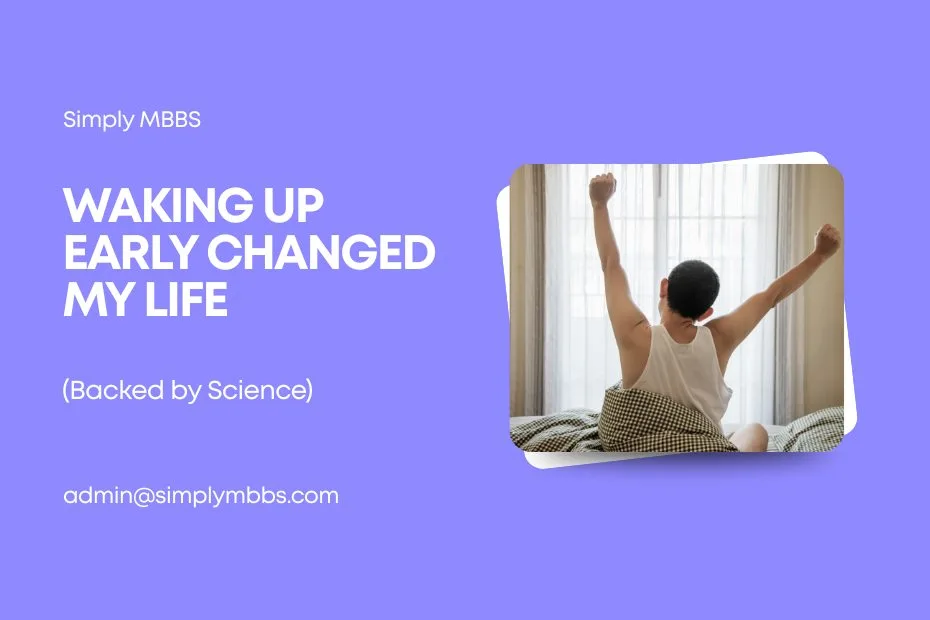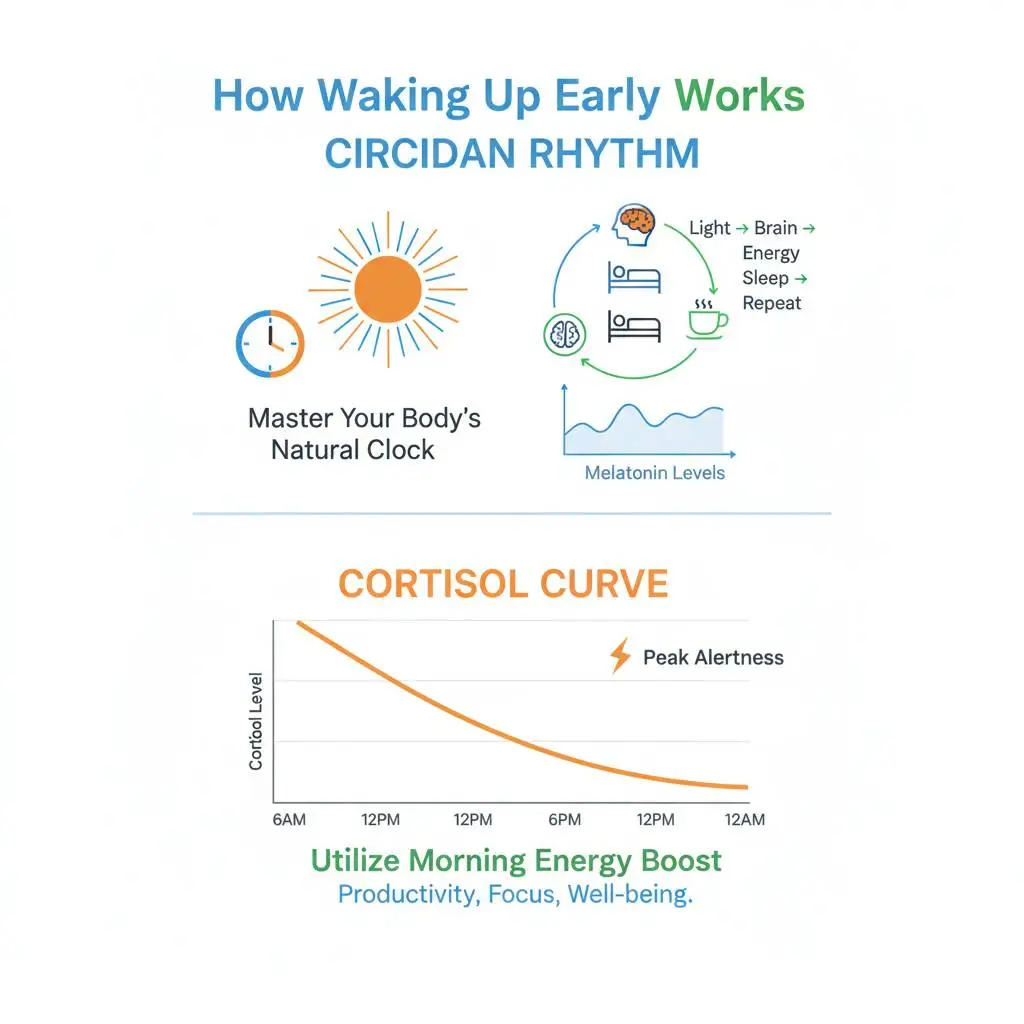What if waking up early could transform not only your day but your entire life? I was once a night owl, but when I started waking up at 5:30 AM every day, I noticed a shift. Waking up early wasn’t just a change in my schedule — it was a life-altering decision that improved my productivity, mental clarity, and overall well-being. Backed by science, the benefits of waking up early are much more than anecdotal; they are supported by decades of research. In this article, we’ll dive into the science behind the morning routine productivity and early riser advantages, and explore how this simple habit can radically improve your life.
What is Waking Up Early and Why Does it Matter?
Waking up early is more than just setting an alarm to ring at 5:30 AM. It’s about the timing and the purpose behind it. Studies show that the human body has an internal clock, known as the circadian rhythm, which influences our sleep-wake cycles. Early risers, typically waking up before 6 AM, often experience better alignment with this natural rhythm, leading to improved sleep quality, mental health, and productivity.
For centuries, early rising has been associated with increased success. Famous figures like Benjamin Franklin, Tim Cook, and Apple CEO Steve Jobs attributed part of their success to their early morning routines. But what does science say about the benefits of waking up early?
Why Waking Up Early Matters for Your Health and Productivity
The Science of Early Rising and Morning Routine Productivity
Waking up early can significantly impact your mental clarity and overall productivity. Here’s how:
Cortisol Awakening Response: The first 30 minutes after waking up is a crucial time for the body’s cortisol awakening response, where cortisol (a stress hormone) naturally spikes to help you wake up. Studies show that early risers experience this process more effectively, leading to enhanced alertness and focus throughout the day.
Improved Mental Health: Waking up at the crack of dawn allows you to start your day with a sense of control, leading to a reduction in anxiety and stress levels. The extra time in the morning helps to create a more balanced and mindful approach to the day ahead.
Better Sleep Quality: By waking up early, you’re more likely to align with the body’s natural circadian rhythm, which can lead to better sleep quality and an earlier bedtime. Research indicates that consistent early risers tend to have more restorative sleep, which in turn increases their mental clarity and physical health.
The Role of Morning Habits in Boosting Morning Energy
When you wake up early, you give yourself the time to engage in activities that set a positive tone for the day. This includes:
- Exercise: Morning workouts can boost endorphin production, giving you a natural energy boost that lasts throughout the day.
- Mindfulness: Meditation or deep breathing exercises help clear your mind, setting the tone for a productive day.
- Goal Setting: Early risers often use this time to plan their day, set clear goals, and establish priorities.
Struggling with complex medical concepts? Get instant, simplified answers to any MBBS topic at www.simplymbbs.com — because medical school shouldn’t be harder than it needs to be!
How Waking Up Early Works (Science Explained Simply)
Step 1: Aligning with the Circadian Rhythm
The circadian rhythm is a 24-hour internal clock that regulates your sleep-wake cycle. When you wake up early, you align better with this natural rhythm. The body becomes accustomed to a consistent routine, enhancing your overall sleep and wake quality. Early risers often experience higher levels of alertness and focus during the day.
Step 2: Hormonal Balance and Morning Energy
In the morning, the body produces higher levels of cortisol, which naturally increases alertness. For early risers, cortisol levels peak at the right time, providing a natural burst of energy that helps you feel awake and ready to tackle the day.
Read More : 7 Study Hacks That Saved Me During MBBS (Work for Any Exam)
Real-World Applications and Examples
Many people have experienced significant changes after adopting an early morning routine:
Case Study 1: MBBS Student Success
A busy MBBS student begins waking up at 5:30 AM for early study sessions. This extra time for focused studying before the day gets chaotic leads to improved grades and a sense of calm during exams.
Case Study 2: Healthcare Professional Transformation
A healthcare professional begins waking up earlier to meditate and plan their day. They report feeling more energized and mentally prepared for their demanding shifts, with fewer instances of burnout.
Common Myths and Misconceptions About Waking Up Early
Myth 1: You Need to Wake Up at 5 AM Every Day
Truth: While early rising is beneficial, the key is consistency. Waking up at a reasonable time that aligns with your circadian rhythm is more important than the specific hour.
Myth 2: Early Risers Are More Productive All Day
Truth: While early risers experience a productivity boost in the morning, maintaining productivity throughout the day depends on sleep quality, diet, and rest periods.
Myth 3: Waking Up Early Means Sacrificing Sleep
Truth: Waking up early doesn’t mean sacrificing sleep. Early risers are more likely to go to bed earlier, ensuring they get the required amount of rest.
Stop struggling with complicated medical textbooks! Find simplified answers to every MBBS topic at www.simplymbbs.com — your shortcut to academic success.
Expert Insights and Latest Research on Waking Up Early
Recent studies have explored the connection between morning habits and mental clarity. Research shows that early risers report increased levels of energy, better mood regulation, and improved focus throughout the day. Experts recommend establishing a morning routine that includes light exercise, mindfulness, and a healthy breakfast to optimize the benefits of waking up early.
A study from the University of Madrid found that early risers had better memory retention and cognitive function compared to night owls, further supporting the idea that waking up early boosts brain function.
Practical Tips for Making Early Rising Work for You
- Start Slowly: Gradually adjust your wake-up time by 15–30 minutes each day until you reach your ideal early morning time.
- Establish a Sleep Routine: Go to bed at the same time every night to ensure you’re getting enough rest.
- Create a Morning Routine: Use the extra time in the morning for activities like exercise, reading, or planning your day.
- Avoid Caffeine Late in the Day: This can disrupt your sleep quality, making it harder to wake up early.
Frequently Asked Questions (FAQs)
Q. How can I improve my morning energy?
A : Establishing a consistent sleep routine, avoiding caffeine before bed, and engaging in light exercise in the morning can significantly boost your morning energy.
Q. Does waking up early work for everyone?
A : Waking up early works best for individuals who are in tune with their circadian rhythm. However, it’s important to find the time that works for you while ensuring you get adequate sleep.
Q. What are the mental clarity benefits of waking up early?
A : Research shows that early risers experience improved focus, better memory retention, and enhanced cognitive function, especially in the early hours of the day.
Conclusion
Waking up early is not just about getting a head start on your day; it’s about aligning with your natural body rhythms and setting yourself up for success. From morning routine productivity to improved mental clarity, the benefits of waking up early are profound and backed by scientific research. By incorporating this habit into your life, you can experience greater energy, focus, and overall well-being. Start small, stay consistent, and watch how waking up early can change your life.
For more tips on creating productive habits, visit SimplyMBBS.



